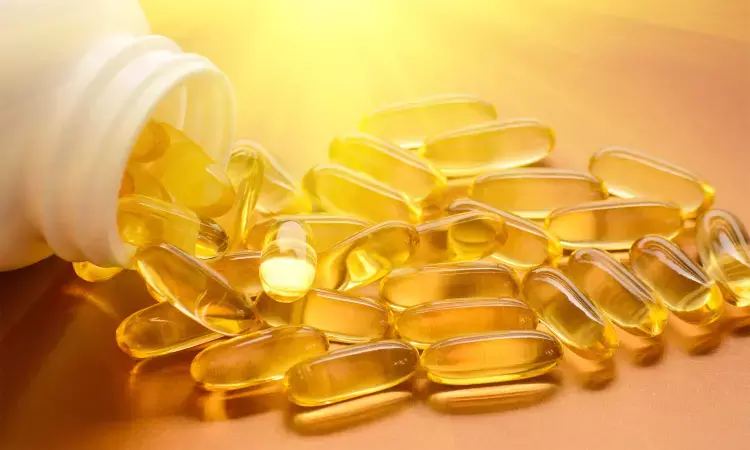- Home
- Medical news & Guidelines
- Anesthesiology
- Cardiology and CTVS
- Critical Care
- Dentistry
- Dermatology
- Diabetes and Endocrinology
- ENT
- Gastroenterology
- Medicine
- Nephrology
- Neurology
- Obstretics-Gynaecology
- Oncology
- Ophthalmology
- Orthopaedics
- Pediatrics-Neonatology
- Psychiatry
- Pulmonology
- Radiology
- Surgery
- Urology
- Laboratory Medicine
- Diet
- Nursing
- Paramedical
- Physiotherapy
- Health news
- Fact Check
- Bone Health Fact Check
- Brain Health Fact Check
- Cancer Related Fact Check
- Child Care Fact Check
- Dental and oral health fact check
- Diabetes and metabolic health fact check
- Diet and Nutrition Fact Check
- Eye and ENT Care Fact Check
- Fitness fact check
- Gut health fact check
- Heart health fact check
- Kidney health fact check
- Medical education fact check
- Men's health fact check
- Respiratory fact check
- Skin and hair care fact check
- Vaccine and Immunization fact check
- Women's health fact check
- AYUSH
- State News
- Andaman and Nicobar Islands
- Andhra Pradesh
- Arunachal Pradesh
- Assam
- Bihar
- Chandigarh
- Chattisgarh
- Dadra and Nagar Haveli
- Daman and Diu
- Delhi
- Goa
- Gujarat
- Haryana
- Himachal Pradesh
- Jammu & Kashmir
- Jharkhand
- Karnataka
- Kerala
- Ladakh
- Lakshadweep
- Madhya Pradesh
- Maharashtra
- Manipur
- Meghalaya
- Mizoram
- Nagaland
- Odisha
- Puducherry
- Punjab
- Rajasthan
- Sikkim
- Tamil Nadu
- Telangana
- Tripura
- Uttar Pradesh
- Uttrakhand
- West Bengal
- Medical Education
- Industry
High‐dose Vitamin D harmful for bone health in women, reveals study

Researchers do not support the benefit of high‐dose vitamin D supplementation for bone health of postmenopausal women.
Canada: High-dose vitamin D supplementation results in greater losses in total bone mineral density (BMD) in women than in men, suggests a recent study. The findings from the study were presented at the virtual American Society for Bone and Mineral Research (ASBMR) meeting and published in the Journal of Bone and Mineral Research.
The results are significant as vitamin D supplementation is administered widely to postmenopausal women for the prevention of osteoporosis. The study raises the possibility of harm from high dose vitamin D supplementation in females.
The study by Lauren A Burt, University of Calgary, Calgary, Canada, and colleagues whether three years of high‐dose vitamin D supplementation (400, 4000, 10,000 IU) in healthy vitamin D‐sufficient individuals aged 55‐70 years (serum 25(OH)D 30‐125 nmol/L at baseline), results in a negative dose‐response relationship for bone density and strength and whether the response differs between males and females.
The study included 311 participants (53% male). They were randomized to receive 400 (M=61, F=48), 4000 (M=51, F=49), or 10,000 (M=53, F=49) IU daily vitamin D3. They were then scanned on high‐resolution peripheral quantitative computed tomography (HR‐pQCT) for measuring total volumetric BMD (TtBMD) at baseline, 6, 12, 24 and 36 months.
Finite element analysis estimated bone strength. Balance, physical function, and clinical biochemistry parameters were also assessed.
Key findings of the study include:
- Baseline, three‐month, and three‐year levels of 25(OH)D were 76.3, 76.7, and 77.4 nmol/L (400); 81.3, 115.3, and 132.2 (4000); and 78.4, 188.0, and 144.4 (10,000).
- There were significant time‐by‐treatment group‐by‐sex interactions for TtBMD at the radius and tibia.
- Treatment with 4000 or 10,000 compared to 400 IU resulted in TtBMD losses in females, but this was not observed with males.
- After three years, females lost 1.8% (400), 3.8% (4000) and 5.5% (10,000), whereas males lost 0.9% (400), 1.3% (4000) and 1.9% (10,000) at the radius.
- At the tibia, losses in TtBMD were smaller, but followed a similar trend.
- There were no significant bone strength interactions.
"Our findings do not support a benefit of high‐dose vitamin D supplementation for bone health, and raise the possibility of harm for females," concluded the authors.
The study was presented at the virtual meeting of ASBMR 2020 and published in the Journal of Bone and Mineral Research.
Dr Kamal Kant Kohli-MBBS, DTCD- a chest specialist with more than 30 years of practice and a flair for writing clinical articles, Dr Kamal Kant Kohli joined Medical Dialogues as a Chief Editor of Medical News. Besides writing articles, as an editor, he proofreads and verifies all the medical content published on Medical Dialogues including those coming from journals, studies,medical conferences,guidelines etc. Email: drkohli@medicaldialogues.in. Contact no. 011-43720751


